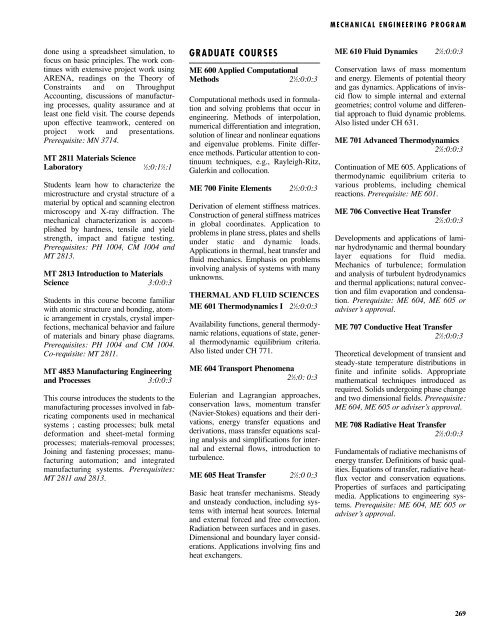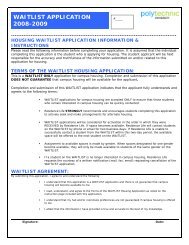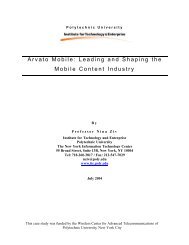POLYTECHNIC UNIVERSITY 2005-2007
POLYTECHNIC UNIVERSITY 2005-2007
POLYTECHNIC UNIVERSITY 2005-2007
You also want an ePaper? Increase the reach of your titles
YUMPU automatically turns print PDFs into web optimized ePapers that Google loves.
MECHANICAL ENGINEERING PROGRAM<br />
done using a spreadsheet simulation, to<br />
focus on basic principles. The work continues<br />
with extensive project work using<br />
ARENA, readings on the Theory of<br />
Constraints and on Throughput<br />
Accounting, discussions of manufacturing<br />
processes, quality assurance and at<br />
least one field visit. The course depends<br />
upon effective teamwork, centered on<br />
project work and presentations.<br />
Prerequisite: MN 3714.<br />
MT 2811 Materials Science<br />
Laboratory 1<br />
⁄2:0:1 1 ⁄2:1<br />
Students learn how to characterize the<br />
microstructure and crystal structure of a<br />
material by optical and scanning electron<br />
microscopy and X-ray diffraction. The<br />
mechanical characterization is accomplished<br />
by hardness, tensile and yield<br />
strength, impact and fatigue testing.<br />
Prerequisites: PH 1004, CM 1004 and<br />
MT 2813.<br />
MT 2813 Introduction to Materials<br />
Science 3:0:0:3<br />
Students in this course become familiar<br />
with atomic structure and bonding, atomic<br />
arrangement in crystals, crystal imperfections,<br />
mechanical behavior and failure<br />
of materials and binary phase diagrams.<br />
Prerequisites: PH 1004 and CM 1004.<br />
Co-requisite: MT 2811.<br />
MT 4853 Manufacturing Engineering<br />
and Processes 3:0:0:3<br />
This course introduces the students to the<br />
manufacturing processes involved in fabricating<br />
components used in mechanical<br />
systems ; casting processes; bulk metal<br />
deformation and sheet-metal forming<br />
processes; materials-removal processes;<br />
Joining and fastening processes; manufacturing<br />
automation; and integrated<br />
manufacturing systems. Prerequisites:<br />
MT 2811 and 2813.<br />
GRADUATE COURSES<br />
ME 600 Applied Computational<br />
Methods 2 1 ⁄2:0:0:3<br />
Computational methods used in formulation<br />
and solving problems that occur in<br />
engineering. Methods of interpolation,<br />
numerical differentiation and integration,<br />
solution of linear and nonlinear equations<br />
and eigenvalue problems. Finite difference<br />
methods. Particular attention to continuum<br />
techniques, e.g., Rayleigh-Ritz,<br />
Galerkin and collocation.<br />
ME 700 Finite Elements 2 1 ⁄2:0:0:3<br />
Derivation of element stiffness matrices.<br />
Construction of general stiffness matrices<br />
in global coordinates. Application to<br />
problems in plane stress, plates and shells<br />
under static and dynamic loads.<br />
Applications in thermal, heat transfer and<br />
fluid mechanics. Emphasis on problems<br />
involving analysis of systems with many<br />
unknowns.<br />
THERMAL AND FLUID SCIENCES<br />
ME 601 Thermodynamics I 2 1 ⁄2:0:0:3<br />
Availability functions, general thermodynamic<br />
relations, equations of state, general<br />
thermodynamic equilibrium criteria.<br />
Also listed under CH 771.<br />
ME 604 Transport Phenomena<br />
2 1 ⁄2:0: 0:3<br />
Eulerian and Lagrangian approaches,<br />
conservation laws, momentum transfer<br />
(Navier-Stokes) equations and their derivations,<br />
energy transfer equations and<br />
derivations, mass transfer equations scaling<br />
analysis and simplifications for internal<br />
and external flows, introduction to<br />
turbulence.<br />
ME 605 Heat Transfer 2 1 ⁄2:0 0:3<br />
Basic heat transfer mechanisms. Steady<br />
and unsteady conduction, including systems<br />
with internal heat sources. Internal<br />
and external forced and free convection.<br />
Radiation between surfaces and in gases.<br />
Dimensional and boundary layer considerations.<br />
Applications involving fins and<br />
heat exchangers.<br />
ME 610 Fluid Dynamics 2 1 ⁄2:0:0:3<br />
Conservation laws of mass momentum<br />
and energy. Elements of potential theory<br />
and gas dynamics. Applications of inviscid<br />
flow to simple internal and external<br />
geometries; control volume and differential<br />
approach to fluid dynamic problems.<br />
Also listed under CH 631.<br />
ME 701 Advanced Thermodynamics<br />
2 1 ⁄2:0:0:3<br />
Continuation of ME 605. Applications of<br />
thermodynamic equilibrium criteria to<br />
various problems, including chemical<br />
reactions. Prerequisite: ME 601.<br />
ME 706 Convective Heat Transfer<br />
2 1 ⁄2:0:0:3<br />
Developments and applications of laminar<br />
hydrodynamic and thermal boundary<br />
layer equations for fluid media.<br />
Mechanics of turbulence; formulation<br />
and analysis of turbulent hydrodynamics<br />
and thermal applications; natural convection<br />
and film evaporation and condensation.<br />
Prerequisite: ME 604, ME 605 or<br />
adviser’s approval.<br />
ME 707 Conductive Heat Transfer<br />
2 1 ⁄2:0:0:3<br />
Theoretical development of transient and<br />
steady-state temperature distributions in<br />
finite and infinite solids. Appropriate<br />
mathematical techniques introduced as<br />
required. Solids undergoing phase change<br />
and two dimensional fields. Prerequisite:<br />
ME 604, ME 605 or adviser’s approval.<br />
ME 708 Radiative Heat Transfer<br />
2 1 ⁄2:0:0:3<br />
Fundamentals of radiative mechanisms of<br />
energy transfer. Definitions of basic qualities.<br />
Equations of transfer, radiative heatflux<br />
vector and conservation equations.<br />
Properties of surfaces and participating<br />
media. Applications to engineering systems.<br />
Prerequisite: ME 604, ME 605 or<br />
adviser’s approval.<br />
269




